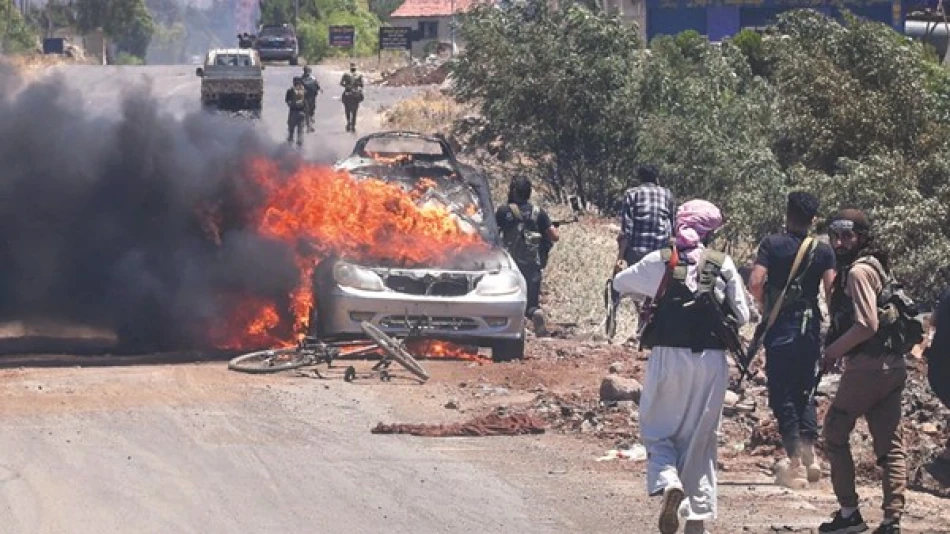
Renewed Clashes in Sweida as UN Calls for Probe into Escalating Violence
Syria's As-Suwayda Spirals Into Chaos as Government Forces Withdraw Under Israeli Pressure
The southern Syrian city of As-Suwayda has descended into violent chaos after government forces withdrew under Israeli threats, leaving behind a humanitarian catastrophe that has killed approximately 600 people and displaced 80,000 residents. The crisis exposes the fragility of Syria's post-conflict reconstruction and highlights how regional powers continue to shape the country's territorial control through military pressure.
A Powder Keg Ignites Over a Kidnapping
What began as a dispute over the kidnapping of a vegetable trader last Sunday has escalated into full-scale sectarian violence between Bedouin fighters and local armed groups. The Syrian government's decision to intervene militarily—allegedly siding with Bedouin factions—transformed a localized conflict into a broader confrontation that has overwhelmed the region's infrastructure.
The city's sole government hospital has received over 400 bodies since Monday, according to the head of As-Suwayda's medical association. A medical worker described catastrophic conditions: "The situation is very bad... no water, no electricity... and medicines are running out severely."
Israeli Ultimatum Forces Syrian Retreat
Israel's military intervention proved decisive in reshaping the conflict. After bombing key Syrian government installations—including the General Staff headquarters and areas near the presidential palace in Damascus—Israel issued an ultimatum: withdraw from As-Suwayda province or face escalated airstrikes.
President Ahmed al-Sharaa's decision to pull back government forces reflects Syria's limited options when confronting Israeli military pressure. His stated desire to avoid a "wide war" with Israel demonstrates how external powers continue to dictate Syrian territorial control, even in areas far from traditional conflict zones.
Humanitarian Diplomacy in Action
Israel's announcement of $600,000 in humanitarian aid to As-Suwayda—including food supplies and medical equipment—represents a calculated soft-power move. This approach mirrors strategies used by regional powers to build influence in fragmented states, offering immediate relief while establishing political leverage.
Regional Powers Scramble to Contain Spillover
The crisis has triggered alarm among Syria's key international backers. Russian President Vladimir Putin and Turkish President Recep Tayyip Erdogan held emergency consultations, with both leaders expressing "great concern" about the escalating violence. Turkey's assessment that the conflict poses a threat to the entire region reflects broader anxieties about Syria's continued instability.
The United States notably distanced itself from Israel's airstrikes, suggesting coordination limits between the allies when it comes to Syrian intervention strategies.
A Test Case for Post-Conflict Syria
As-Suwayda's collapse offers a sobering preview of Syria's fragility more than a decade after its civil war began. The rapid deterioration from a criminal dispute to sectarian violence, combined with the government's inability to maintain order without triggering international intervention, highlights fundamental weaknesses in Syria's state capacity.
The UN's call for "independent, rapid, and transparent" investigations into the violence, led by High Commissioner for Human Rights Volker Türk, underscores the international community's limited tools for addressing such crises. With 80,000 people displaced and basic services collapsed, As-Suwayda has become a humanitarian emergency that regional powers seem more interested in containing than resolving.
The Broader Implications
This crisis demonstrates how quickly localized conflicts can spiral beyond government control in post-conflict environments. Syria's experience mirrors patterns seen in Libya, Yemen, and other fragmented states where central authority remains weak and external powers maintain veto power over territorial control.
For Syria's long-term stability, the As-Suwayda crisis represents both a warning and a test case. The government's ability to restore order without triggering broader regional intervention will likely influence how similar future conflicts are managed across the country.
Most Viewed News

 Layla Al Mansoori
Layla Al Mansoori






